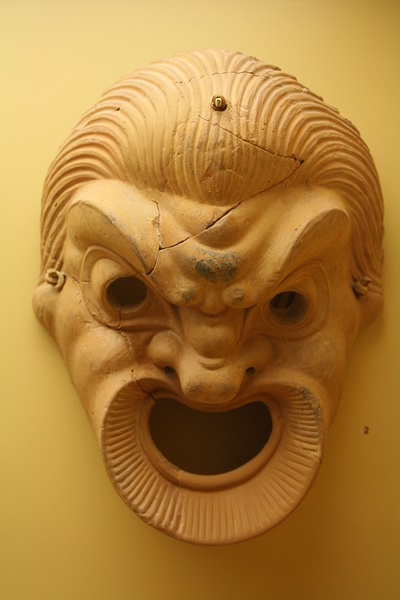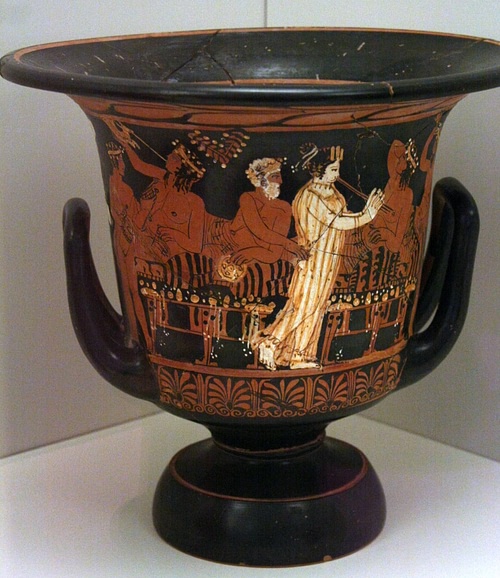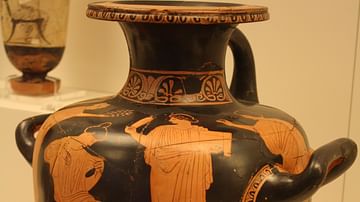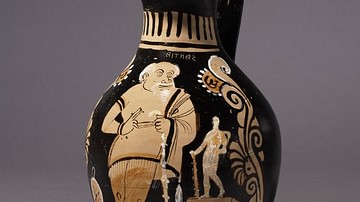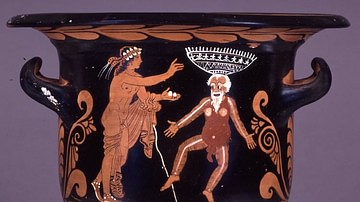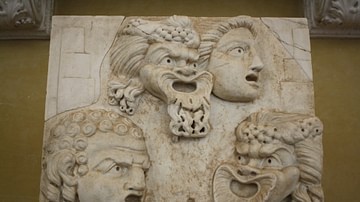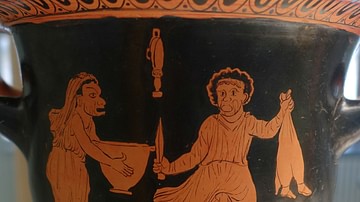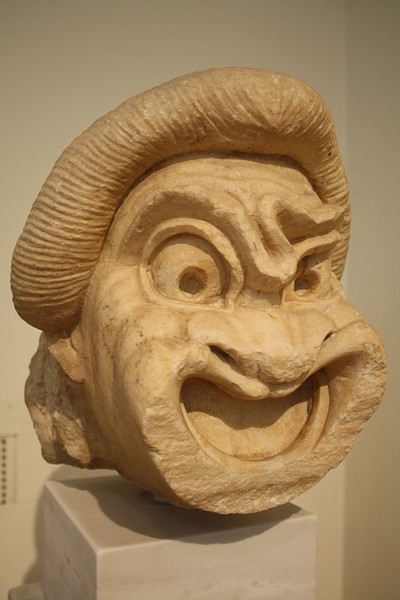
The Wasps is a play written by the lone representative of Ancient Greece's Old Attic Comedy, Aristophanes (c. 445 - c. 386 BCE). It won second place at the Lenaea competition in 422 BCE. Written in two acts, the play focuses on a reoccurring theme, the tension between the old and new.
The first act revolves around the young Athenian Bdelycleon (Cleon-hater) and his old-fashioned father Philocleon (Cleon-lover). Bdelycleon endeavors to prevent the father from participating in the city's jury system; a system he believes is controlled by the unscrupulous pro-war Athenian leadership, namely Cleon. The son barricades his father in the house, stationing two slaves outside to prevent his escape. Late, one night, dressed as wasps and denouncing the son as pro-Spartan, a chorus of old men arrives at their house and endeavors to help Philocleon escape and perform what they consider to be their civic duty. Finally, the son cures his father of his passion for the law court by staging a mock trial of their own at home, trying a dog for the theft of a piece of cheese.
In the second act, the young sophisticated Bdelycleon struggles to teach his father how to act more refined in society, demonstrating how to lie properly on a couch, dress, and use good table manners. Unfortunately, the father is incapable of reform, and the son fails miserably. After a long and troublesome evening, the old man is issued a court summons for his violent conduct during and after a party. The son finally learns that changing his father is hopeless.
Aristophanes
Little is known of Aristophanes' early life; even his birth date is questioned. Although his family owned land on the island of Aegina, Aristophanes was a native of Athens, the son of Philippus. He had two sons of whom Aroses was a minor playwright. In David Barrett's translation Aristophanes: Frogs and Other Plays, the playwright was touted as one of the greatest examples of the grace, charm, and scope of Athenian Greece. Editor Moses Hadas in his Greek Drama said he could write delicate and refined poetry but could also demonstrate bawdiness and gaiety. His comedy was seen as a masterful blend of risqué wit and invention. However, to others, he brought Greek tragedy down from the high levels of Aeschylus with his use of parody, satire, and vulgarity.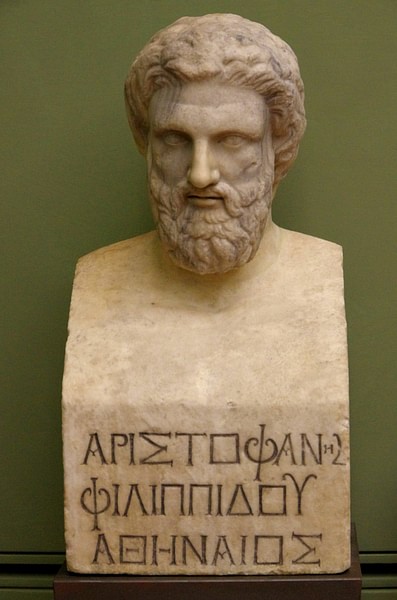
As the other 5th-century BCE playwrights, he dealt with many contemporary issues. Many of his plays were written during the long war between Athens and Sparta and contain not-so-subtle attacks on the Athenian leadership. As evident in many of his comedies, Aristophanes was an ardent opponent of the war, and the pro-war advocate and statesman Cleon became an easy target for his ire. The playwright had been taken to court for his verbal attacks on Cleon in the play The Babylonians. Although Pericles attempted to ban comic criticism of people like Cleon, it had little success and was soon rescinded. Often criticized for their crude humor and suggestive tone, Aristophanes plays were popular among the Athenian audiences. His preferred targets were politicians, philosophers (Socrates was a favorite), poets, scientists, and even musicians. Unfortunately, only eleven of his 40 plays have survived. The Wasps takes a subtle look at one of these targets: the Athenian legal system.
Characters
The cast of characters includes:
- Xanthias
- Sosias
- Bdelycleon
- Philocleon
- Labes
- The Dog
- a reveler
- a baking woman
- a citizen
- several silent characters
- and, of course, the chorus
The Plot
Act One
Late one evening, two slaves, Xanthias and Sosias, sit outside the home of the young Athenian Bdelycleon and his father Philocleon. There are barricades in the front of the house and across the windows; huge netting covers the entire house. Xanthias addresses the audience informing them of the circumstances behind their nighttime vigil:
The big man asleep up there on the roof, he's our master. He's ordered us to stand guard over his father and keep him locked inside, so that he can't escape. You see, the old man's suffering from a very peculiar disease. [...] He yearns to sit in judgment and pines if he's denied a front row seat. (Barrett, 11-12)
Despite a number of efforts, Bdelycleon has been unable to convince his father otherwise. In the background one hears the father yelling to let him out, claiming the oracle at Delphi has told him if he ever acquitted a man he would wither away. The old man even attempts to ride out on the underside of the family's donkey, claiming he intended on going to the market.
In the distance, they hear a loud buzzing: the father's fellow jurors, all veterans like the Philocleon and dressed as wasps, complete with stingers. They are coming to escort the old man to court. They call for Philocleon to come out and join them. He shouts from inside the house that his son would not let him. An argument between Bdelycleon and the chorus (wasp) leader ensues. Bdelycleon warns Xanthias not to provoke the old jurors. Philocleon declares:
He won't allow me to go to court; he won't let me do harm to anybody. He wants to give me the easy life. (20)
The chorus leader is appalled and exclaims that this was a threat to democracy, adding that the son is both a traitor and conspirator. As Philocleon makes several more futile attempts to escape, the wasp leader reassures him:
We'll make him run for his life. That'll teach him to disrespect the ballot box. (21)
The frustrated Bdelycleon begs the chorus to stop the incessant buzzing and listen, but the chorus of old men ignore him and turn around like angry wasps: “Wasps! About turn! Present stings!” (23) As the wasps charge, Philocleon makes a quick dash for freedom but is grabbed by two slaves. Bdelycleon runs from the house carrying torches; the chorus retreats. Finally, Bdelycleon asks to negotiate and come to an agreement. The chorus leader is reluctant:
Arrangement? With you! You enemy of the people! You monarchist! You long-haired Amynias! You tassel-fringed pro-Spartan, in cahoots with Brasidas [Spartan general]. (25)
Bdelycleon turns to his father and pleads with him to listen to what he has to say: "…you don't realize how you're being taken in by these men you almost worship. You're a slave without realizing it" (26). He even calls his father a lackey, asking him what he could possibly get out of jury duty. Finally, an arrangement is reached; the father and son will each state his case before the chorus.
The father goes first and pleads his case. He reveals how defendants bow to him and beg him to have mercy. He adds that the best thing about being a juror is the pay. The chorus applauds his “sensible speech” and “splendid performance” (31) Now, the son takes his turn, knowing he must prove to his father that he is nothing more than a slave. The first question the father is asked: where does the money from tribute as well taxes, the mines, markets, and harbor fees go. And, how much of that money goes to the juror? Philocleon calculates that it is only ten percent. Bdelycleon continues:
Well, isn't it slavery when these men, and their cronies, all hold overpaid executive posts, while you're over the moon with your three obols? (33)
Bdelycleon continues. The government gets all the money, giving him only a pittance. The government wants to keep him poor. He is left to chew on leftovers, receiving little from the country he fought for. When the father finally concedes, his son offers a sensible solution: if he likes trying cases why not do it at home. Although confused, the father consents and a makeshift court is immediately set up outside the home.
The first case to come before Philocleon is against their family dog, Labes, who is accused of stealing a piece of Sicilian cheese. Their other dog - simply called The Dog - expressed a desire to open for the prosecution. The two dogs are brought before the father, escorted by two slaves. The case was initiated by The Dog “on the grounds that the said Labes did willfully and feloniously wrong and injure one Sicilian cheese by eating it all himself” (41). The plaintiff, The Dog (a nickname for Cleon who was called the watchdog of Athens), speaks out against Labes:
He must be punished for this. There's no room for two thieves in one patch. I don't see why I should go to barking in vain. (43)
While Labes does not speak on his behalf, Bdelycleon does, claiming Labes is a good watchdog and a noble creature. He begs Philocleon to have mercy; the dog works tirelessly while The Dog (Cleon) stays at home but demands his fair share. Bdelycleon rests his case, asking for an acquittal. The old man is beside himself, so his son helps by leading him to the urns where Philocleon drops in his voting pebble; it was for acquittal. He had been tricked, allowing a guilty man to escape. Believing now that his life was over, the son promises to show him a new life: a life of dinners and parties.
Act Two
Two couches are brought outside the house. Father and son enter. After a long struggle, Bdelycleon finally removes the old tattered cloak of his father and replaces with it with a Persian gown. His old felt shoes are exchanged for Spartans with leather straps. Next, the old man is asked to walk with “an elegant, affluent swagger” (51). Painfully, Bdelycleon attempts to teach his father how to act in a social setting – even how to sit properly on a couch. The son is also concerned with conversation that may occur at a party. He tells his father to say something impressive. They even discuss the songs the father is permitted to sing, avoiding anything that might anger Cleon who is expected to be at the party. Before they leave for the dinner at the home of Philoctemon, the father expresses his reluctance to drink; he knows what that it leads to “breaches of the peace, assault and battery - and a big fine while you've still got a hangover” (57).
The party was a disaster. Beaten black and blue, Xanthias speaks to the chorus:
The old man's been making a terrible nuisance of himself: he's drunker than any of them. And, that's saying something, considering who the others are. (59)
He told crude stories and insulted everyone there. As he left the party, Philocleon abducted the flute girl. As he heads home, a large crowd of people follows him, many of them with a complaint. A concerned Bdelycleon tries to tell his father that the abduction is a criminal offense. One “reveler” stops the old man:
You'll pay for these youthful pranks tomorrow. We'll all be around in the morning, and you'll answer to this in court. (66)
An old baking woman interrupts. Holding an empty tray, she claims she is owed ten obols for the loss of her loaves and promises to see him in Market Court. A citizen with a bandaged head threatens with a lawsuit for assault and battery. Unable to get the father away from the crowd, Bdelycleon finally carries him into the house, but the old man still wants to party. He is soon joined by a second dancer dressed as a crab. They party into the night.
Interpretation
Although Aristophanes' plays were often criticized for their bawdy and risqué nature, the Athenian audiences loved them. Like many fellow tragedians, he used his plays to voice social and political commentary. Throughout much of his life, the war between Sparta and Athens was waging, often at the city's doorstep. Political, pro-war leaders such as Cleon angered Aristophanes, and he used his plays to voice his concern, even finding himself in court. As with Lysistrata, the playwright finds himself at odds against the government of the city he loved. In The Wasps, his target is not only Cleon but the city's jury system. Although democratic in appearance, the system was easily manipulated by the unscrupulous.
The main character of the play, Philocleon truly believes he is providing a valuable service, well-respected by both citizenry and leadership. It is not until his son, Bdelycleon explains how he is being manipulated that the old man changes his mind. Again, as with other plays, Cleon appears as a minor character, The Dog. His testimony against Labes shows how Labes does most of the work while he sits back and wants his share of the profits, namely a piece of the cheese. In the second act of the play - called a “comedy of manners “ (Barrett, 4) - the son attempts (and fails) to change his father's old-fashioned behavior; the often-seen conflict of the old versus the new. While entertaining, the play provided the conservative playwright with an avenue for his anti-war beliefs and distrust of the city's leadership.

